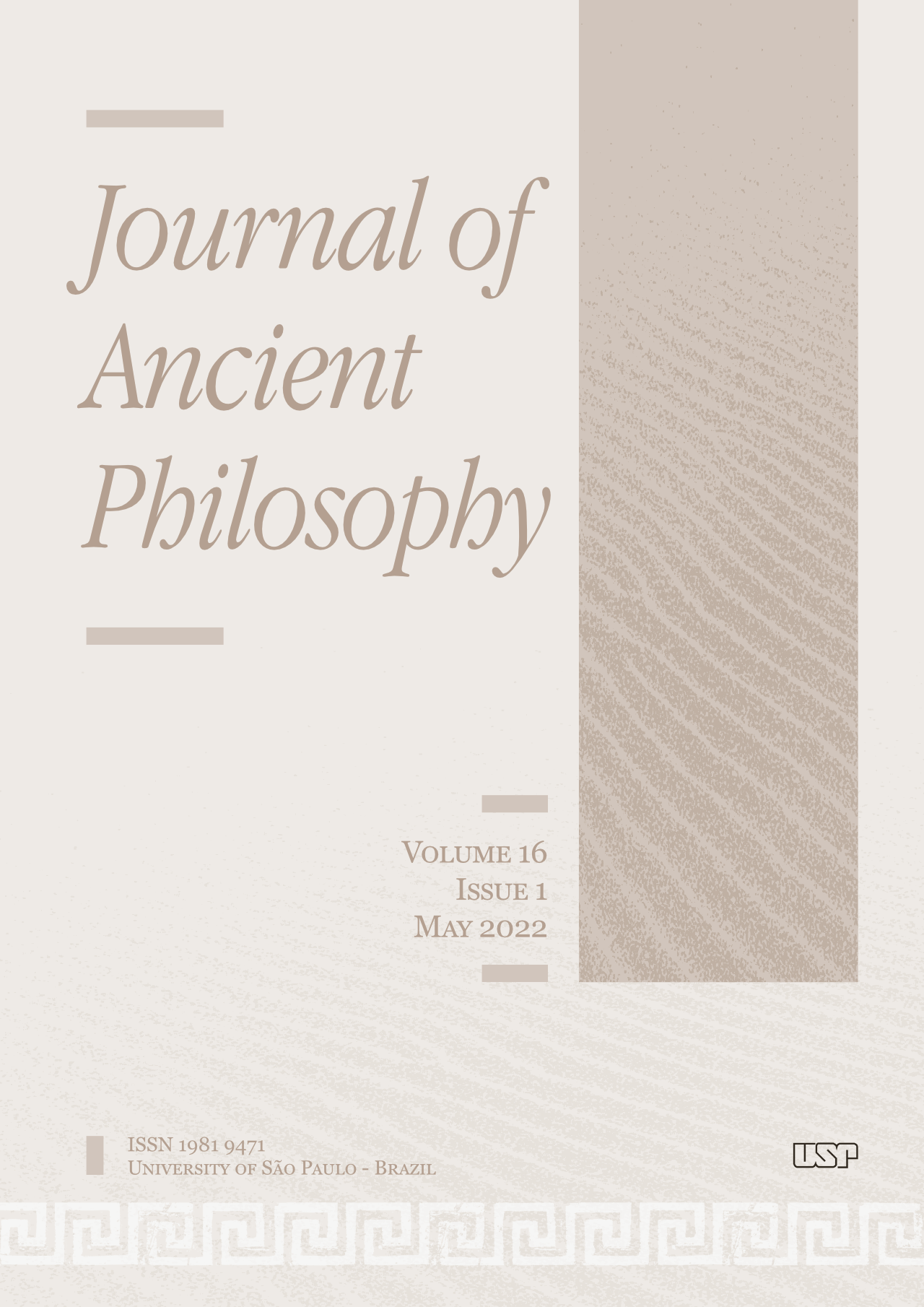Contradiction, Being, and Meaning in Aristotle’s Metaphysics Gamma
DOI:
https://doi.org/10.11606/issn.1981-9471.v16i1p27-50Keywords:
Aristotle, Principle of non-contradiction, Refutation, MetaphysicsAbstract
This paper focuses on Aristotle’s discussion of PNC in Metaphysics Gamma and argues that the argument operates at three different levels: ontological, doxastic, and semantic through the invocation of three philosophical personae: the first one (the philosopher) can only state what is otherwise unprovable, the second one (a geometer) can only confirm that we should trust PNC, the third one (a sophistical opponent) denies PNC and must be silenced. Aristotle cannot prove what is beyond proof. This situation results in a fundamental ambiguity in the figure of the philosopher. The Metaphysics is written from the standpoint of an investigative thinker who admits her puzzlement before a question that will forever remain open and imagines another philosopher who has achieved a god-like insight into the first principles of all things. The path from the first figure to the second one, however, remains an enigmatic leap.
Downloads
References
Corradini, Antonella. “Riflessioni sul principio di non-contraddizione,” Epistemologia, Vol. 8, 1985, 217-246.
Darcy, R. M. Sense and Contradiction in Aristotle (Dordrecht: Reidel, 1975).
Derrida, Jacques. Of Grammatology, tr. Gayatri Shakravorty Spivak, Baltimore: Johns Hopkins University Press 1998.
Gottlieb, Paula, “Aristotle on Non-contradiction,” The Stanford Encyclopedia of Philosophy (Spring 2019), Edward N. Zalta (ed.). URL = <https://plato.stanford.edu/archives/spr2019/entries/aristotle-noncontradiction/>. Last accessed, July 21, 2021.
Heidegger, Martin. The Metaphysical Foundations of Logic, trans. Michael Heim, (Bloomington, IN: Indiana University Press, 1984).
Hudry, Jean-Louis. “Aristotle on Non-Contradiction: Philosophers vs. Non-Philosophers,” Journal of Ancient Philosophy, Vol. 7/2, 2013, 51-74.
Kal, Victor. On Intuition and Discursive Reasoning in Aristotle (Leiden: Brill, 1988)
Kirby, Jeremy. The Gamma Paradoxes, An Analysis of the Fourth Book of Aristotle’s Metaphysics, (Lanham: MD: Lexington Books 2018).
Leclerc, Marc. “La confirmation performative des premiers principes” in Revue Philosophique de Louvain, Vol. 96, 1 (1998) 69-85.
Leibniz, New Essays on Human Understanding, edited by Peter Remnant and Jonathan Bennett (Cambridge: Cambridge University Press 1996).
Łukasiewicz, Jan. (trans. Vernon Wedin), “On the Principle of Contradiction in Aristotle,” The Review of Metaphysics, Vol. 24.3 1971, 485-509.
Meinong, Alexius. The Theory of Objects, trans. I. Levi, D.B. Terrell, and R. Chisholm in Realism and the Background of Phenomenology, ed. Roderick Chisholm (Atascadero, CA: Ridgeview, 1981), pp. 76–117.
De Praetere, Thomas. “La justification du principe de non-contradiction” Revue Philosophique de Louvain 1998, Vol. 96.1, 51-68.
Priest, Graham. “To Be and Not to Be – That is the Answer. On Aristotle on the Law of Non-Contradiction,” Philosophiegeschichte und logische Analyse, Vol. 1, 1998, 91-130
Rapp, Christof. “His Dearest Enemy, Heraclitus in the Aristotelian Oeuvre” in: Enrica Fantino, Ulrike Muss, Kurt Sier, and Charlotte Schubert (eds.) Heraklit im Kontext, (Berlin/Boston: De Gruyter, 2017) 415-438.
Wedin, Michael. “Aristotle on the Firmness of the Principle of Non-Contradiction” Phronesis Vol. 98.3, 2004, 225-265.
Downloads
Published
Issue
Section
License
Copyright (c) 2022 Pascal Massie

This work is licensed under a Creative Commons Attribution-NonCommercial 4.0 International License.
Copyright
Authors who publish with this journal agree to the following terms:
- Authors retain copyright and grant the journal right of first publication with the work simultaneously licensed under a Creative Commons Attribution License (CC By 4.0) that allows others to share the work with an acknowledgement of the work's authorship and initial publication in this journal.
- Authors are able to enter into separate, additional contractual arrangements for the non-exclusive distribution of the journal's published version of the work (e.g., post it to an institutional repository or publish it in a book), with an acknowledgement of its initial publication in this journal.
- Authors are permitted and encouraged to post their work online (e.g., in institutional repositories or on their website) prior to and during the submission process, as it can lead to productive exchanges, as well as earlier and greater citation of published work (See The Effect of Open Access).


